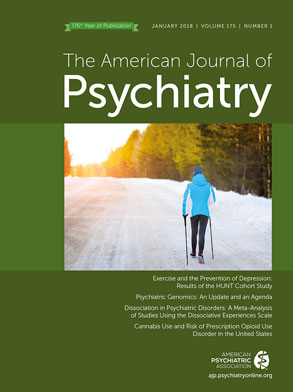This issue initiates our 175th year of continuous of publication. The American Journal of Insanity began publication in 1844 to facilitate sharing of information among superintendents of state mental hospitals. From the first issue, psychiatrists wrote about the numbers of patients they were seeing, interesting brain pathology they had observed, and the latest discussions from Europe on the emerging interest in diagnosis. They regularly discussed problems in the funding of their work by their state legislatures. In 1921 the name of our association was changed to the American Psychiatric Association and the journal was retitled the American Journal of Psychiatry, with a sense of optimism that psychiatry was now better integrated into the general care of the mental problems of people in American communities. These themes—diagnosis and treatment, funding, and integration—continue to be major concerns for psychiatrists and for the Journal in its 175th year.
The Editorial Board and I decided that looking at our past, fascinating though it can be, should not be the focus of our 175th year commemoration. We thought instead that the 175th year should look forward to what the next 25 years might accomplish. To that end, we have solicited Review and Overview articles for this year’s issues that provide perspective on what has been learned and where it might take us in the understanding and treatment of mental disorders. The first in this series, by Patrick Sullivan and his colleagues of the Psychiatric Genomics Collaboration (
1), indeed provides their view of what has been accomplished and their vision of the impact that it can have in the future. Review articles in subsequent issues will focus on a variety of issues, ranging from childhood behavioral problems to cognitive problems in the elderly. We do not entirely neglect our history, however, and the series will include an accounting of the reaction to Kraepelin’s ideas on diagnosis during his lifetime, both in Europe and in the United States, covering issues still relevant to diagnosis today. Each “AJP at 175” Review will have a special logo and will highlight a citation to an earlier
Journal article, to allow readers to see the continuity to what was learned in the past. Although we have Reviews coming from many of the major areas within our field, it would be impossible to cover every mental illness from each of its many perspectives. Colleagues worldwide in all fields and disciplines are always invited to contact us with their own proposals for what should be part of the 175th year and beyond, because the
Journal intends to be here well into the future.
It can at first be discouraging to pick up an older issue, whether from 20 years ago or going back to the 19th century, and realize that the issues our predecessors confronted remain today. Our analytic tools have sharpened, the scope of our research has become more ambitious, and our major findings have continued to build on each other into a considerable knowledge base. However, most psychiatric illnesses still have no prevention and no cure, and their prevalence and impact on our families and communities continue to be substantial. Yet, in both the older issues (our past) and in the AJP Residents' Journal (our future), I am continually impressed with the dedication to the improved care of mental illness throughout our 175 years. Clarence B. Farrar, the longest-serving Editor of the Journal, began the first volume of the retitled American Journal of Psychiatry with a quotation from the 17th-century Dutch philosopher Hugo Grotius: “The care of the human mind is the most noble branch of medicine.” From this Editor’s desk, reading the accounts of what we are doing, it is quite clear that this heritage is still with us. Welcome to our 175th year.
EDITOR'S NOTE: Legacy issues of the
Journal from 1844 onward are available online to APA members and to readers at institutions that have purchased the legacy collection. The
AJP Residents' Journal is published on the
AJP web site at
ajp.psychiatryonline.org.

